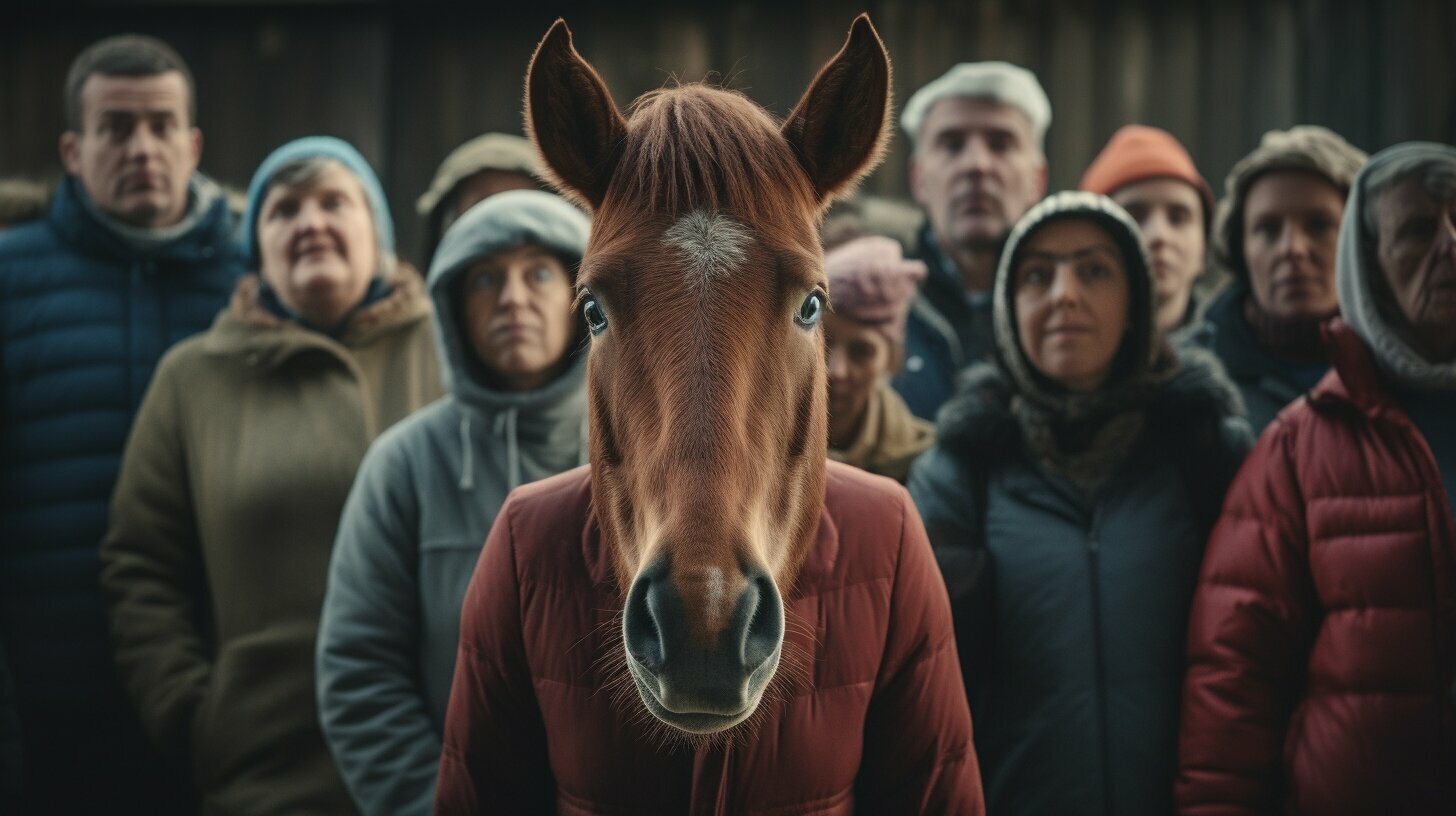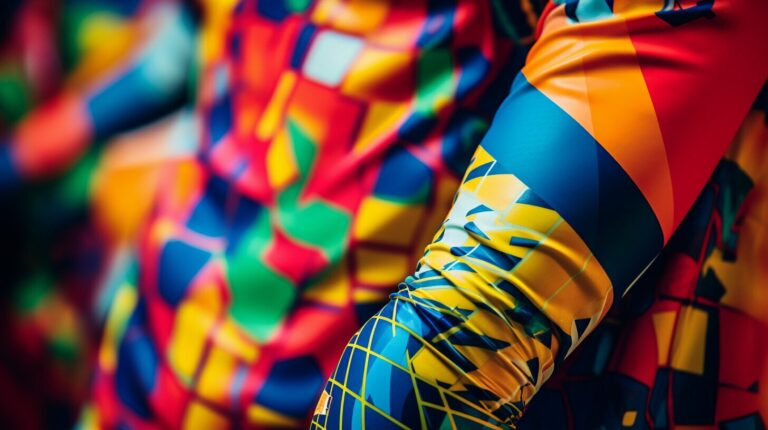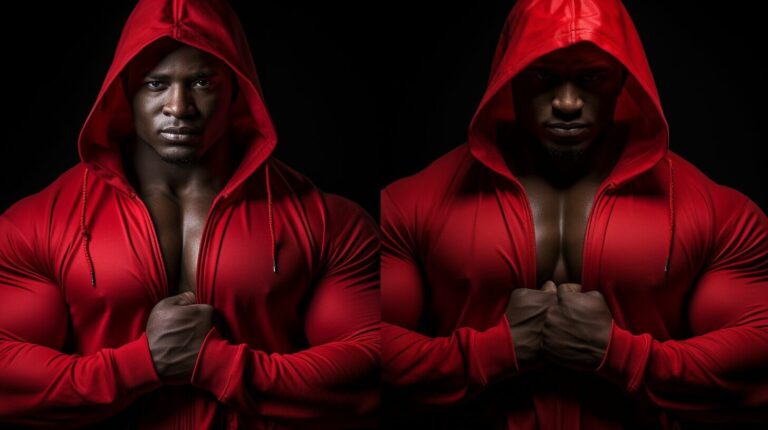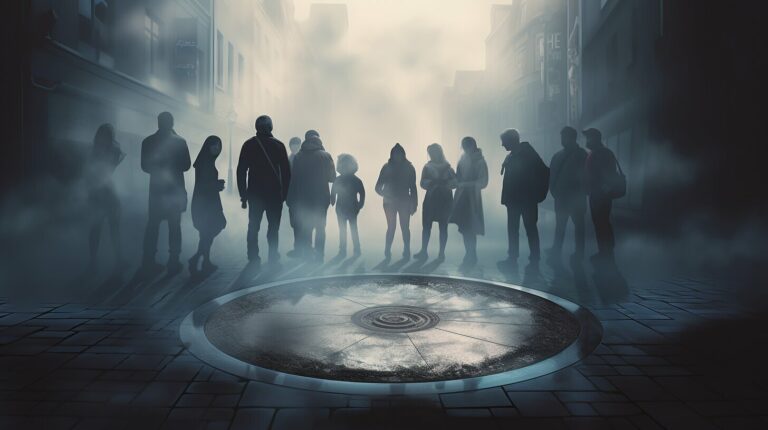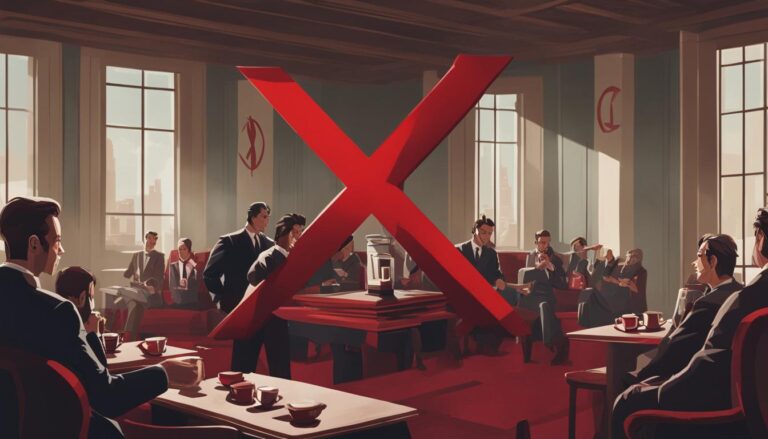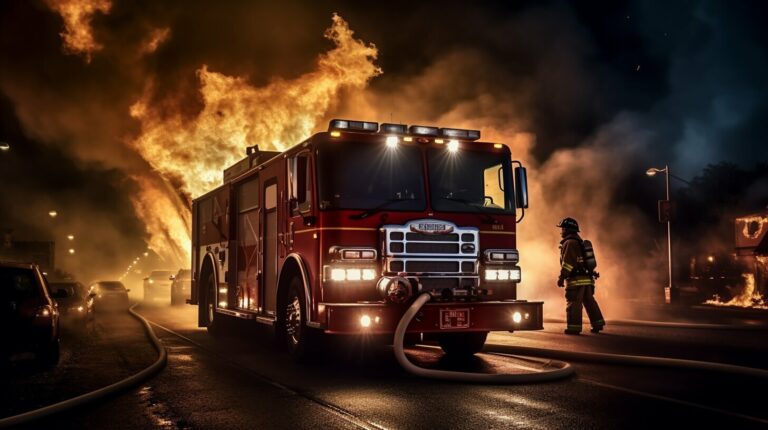Unveiling the Mystery: Why Do People Cover Horses’ Eyes?
Have you ever wondered why people cover horses’ eyes? It may seem like a mysterious practice, but there are actually several reasons behind it. In this article, we will explore the various motivations for covering a horse’s eyes and the benefits it brings to these majestic creatures. So, let’s dive in and unravel the secrets behind horse eye coverings!
Key Takeaways:
- People cover horses’ eyes to protect them from flies, insects, and the harmful effects of sunlight and glare.
- Eye coverings can also help reduce stress and anxiety in horses by limiting their field of vision.
- Fly masks, blinkers, and blinders are different types of horse eye coverings that serve specific purposes.
- The use of eye coverings can vary based on the season and specific activities.
- Covering a horse’s eyes is a way to ensure their well-being and overall eye health.
Now that we’ve scratched the surface of this intriguing topic, let’s explore each aspect in more detail. From protecting against pesky flies to reducing stress levels, there’s a lot more to discover about the fascinating world of horse eye coverings. So, let’s continue our journey and shed light on the reasons behind this common practice!
Protecting Against Flies and Insects
Flies and insects can be a nuisance for horses, but there’s a clever way to protect their sensitive eyes. Horse eye protection, in the form of specially designed fly masks, can help keep these bothersome creatures at bay while ensuring the well-being of our equine friends.
These fly masks are crafted from a breathable mesh material that comfortably covers the horse’s eyes, shielding them from pesky flies and insects. Not only do these masks provide relief from constant buzzing and biting, but they also offer protection against harmful UV rays and excessive brightness.
With their eyes safely covered, horses can enjoy a peaceful and undisturbed time outdoors. The fly masks enable them to maintain their eye health, preventing irritation and potential infections caused by recurrent fly attacks. It’s a win-win situation for both horses and their owners!
| Benefits of Horse Eye Protection: |
|---|
| Protection against flies and insects |
| Shielding from harmful UV rays and excessive brightness |
| Maintaining eye health and preventing infections |
So, the next time you see a horse with its eyes covered, remember that it’s not just a fashion statement. It’s a practical and thoughtful choice to safeguard their sensitive eyes and ensure their overall well-being in the face of pesky flies and insects.
Reducing Stress and Anxiety
Horses, just like humans, can experience stress and anxiety, but there’s an intriguing method to help calm their nervous minds. It turns out that covering their eyes can play a significant role in reducing stress and anxiety levels.
When a horse’s eyes are covered, their field of vision is limited, which helps them feel more secure and focused. In high-stress situations, such as competitions or crowded environments, this reduced field of vision can help horses stay calm and composed. By blocking out distractions and potential threats from their peripheral vision, they can concentrate on the task at hand without becoming overwhelmed.
One particular type of eye covering that aids in reducing stress and anxiety in horses is the blinker or blinder. These coverings are designed to limit a horse’s peripheral vision, allowing them to stay focused and less reactive to external stimuli. By narrowing their field of view to what’s directly ahead, blinkers or blinders encourage horses to pay attention to their rider and the path ahead, rather than getting distracted by their surroundings.
Why does reducing stress and anxiety matter?
Reducing stress and anxiety in horses is crucial for their overall well-being. High stress levels can lead to health issues, behavior problems, and decreased performance. By providing them with the right tools, such as eye coverings, we can help promote a more relaxed and confident equine temperament.
It’s important to note that covering a horse’s eyes should always be done under the guidance of a knowledgeable trainer or veterinarian. Each horse is unique, and their individual needs and preferences should be taken into account when determining the appropriate use of eye coverings.
| Eye Covering Type | Purpose |
|---|---|
| Fly masks | Protection against flies, insects, and UV rays |
| Blinkers or blinders | Limit peripheral vision, helping with focus and reducing anxiety |
| Blindfolds | Used in specific situations, such as horse trailer travel or calming nervous horses |
In conclusion, covering a horse’s eyes can be a valuable tool in reducing stress and anxiety. Whether it’s using fly masks to protect against insects and UV rays or employing blinkers or blinders to encourage focus, these eye coverings can contribute to a horse’s overall well-being. However, it’s crucial to consider individual needs and seek professional guidance when utilizing these tools. By understanding and addressing the unique needs of our equine companions, we can help create a calmer and happier environment for them.
Shielding from Sunlight and Glare
Just like we wear sunglasses on sunny days, horses also need their own eye protection from the blinding sun. Horse visors are designed to shield their eyes from harmful UV rays and excessive brightness, ensuring their eye health and overall well-being.
These visors are made from lightweight and durable materials that provide optimal coverage for the horse’s eyes without obstructing their vision. The visor is strategically positioned to block out the sun’s rays, reducing the risk of eye strain and damage caused by prolonged sun exposure.
Horse visors are especially beneficial when riding or working in open fields or arenas with intense sunlight. They can significantly improve a horse’s comfort and performance by minimizing the discomfort caused by glare, which can often lead to a loss of focus or even a spooked reaction.
The Benefits of Horse Visors:
- Protection against harmful UV rays
- Reduction of glare and eye strain
- Improved focus and performance
- Enhanced comfort and well-being
| Visor Type | Features | Benefits |
|---|---|---|
| Fly Masks | Mesh material covering the eyes | Protection against bugs and UV rays |
| Blinkers or Blinders | Limited peripheral vision | Improved focus on what’s ahead |
“Horse visors are not only fashionable but also essential for your equine friend’s eye care. They provide the necessary protection and comfort to ensure a happy and healthy horse.”
When considering horse eye protection, it’s important to choose the right type of covering based on your horse’s needs and the activities they are involved in. Fly masks are ideal for everyday use, protecting against flies and UV rays, while blinkers or blinders are commonly used in competitive disciplines to enhance focus and reduce distractions.
In conclusion, horse eye protection, such as visors, fly masks, and blinkers, play a vital role in safeguarding a horse’s vision and well-being. By shielding their eyes from sunlight and glare, these coverings help reduce the risk of eye strain, improve focus, and enhance comfort and performance. So, next time you head out with your horse on a sunny day, don’t forget to equip them with the necessary eye protection!
| Horse Eye Protection | Horse Eye Care | Horse Eye Health | Horse Visors |
|---|
Different Types of Horse Eye Coverings
Horse eye coverings come in various forms, each serving a unique purpose and offering specific benefits. From fly masks to blinkers and blinders, these eye coverings play a crucial role in protecting and enhancing a horse’s vision. Let’s take a closer look at some of the most popular options:
Fly Masks
“Fly masks are like sunglasses for horses. They not only shield the eyes from irritating flies and insects but also protect against harmful UV rays,” says Sarah, an experienced horse owner. Made of lightweight and breathable mesh material, fly masks cover the eyes and surrounding areas, keeping bugs at bay while allowing the horse to see clearly. These masks are an essential accessory, particularly during the summer months when flies are abundant. They not only provide comfort but also help maintain the horse’s eye health.
Blinkers or Blinders
“Blinkers or blinders are like a pair of blinders you might see on a racehorse,” says Mike, a horse trainer. These coverings are designed to limit a horse’s peripheral vision, allowing them to focus on what’s ahead and reducing distractions. They are commonly used in racing and driving disciplines to keep the horse focused and prevent spooking. While blinkers or blinders restrict a horse’s field of vision, they do not obstruct their forward view, ensuring they can still navigate safely and effectively.
Other Eye Coverings
In addition to fly masks and blinkers, there are other eye coverings available for horses depending on specific needs. Blindfolds, for example, can be used during horse trailer travel to keep the horse calm and prevent unnecessary stress. Similarly, blindfolds are sometimes used in training situations to help desensitize nervous horses. These coverings provide a temporary loss of vision, allowing the horse to focus on their other senses and promote trust between horse and handler.
Table: A Comparison of Horse Eye Coverings
| Eye Covering | Purpose | Benefits |
|---|---|---|
| Fly Masks | Protects against flies and insects | Prevents irritation, maintains eye health |
| Blinkers or Blinders | Reduces distractions, maintains focus | Improves performance, enhances safety |
| Blindfolds | Calms nervous horses, promotes trust | Relieves stress, aids in training |
As with any horse accessory, it’s important to choose the right eye covering for your horse’s specific needs and activities. Consulting with a veterinarian or experienced horse professional can help determine which type of eye covering is most suitable for your equine companion. Remember, the well-being and comfort of your horse should always be a top priority.
Seasonal and Activity-Based Use
Depending on the time of year and the activities they engage in, horses may require varying degrees of eye protection. Understanding the specific needs of your horse during different seasons and activities is crucial in ensuring their well-being and eye health.
During the warmer months, when flies and insects are abundant, it is essential to protect your horse’s eyes from these pesky creatures. Fly masks, made of breathable mesh material, are a popular choice for providing both comfort and protection. These masks not only shield the eyes from irritating bugs but also help safeguard against harmful UV rays. They are a great option for horses that spend a significant amount of time outdoors.
When it comes to specific activities such as riding or driving, certain eye coverings, like blinkers or blinders, can play a vital role. These coverings limit the horse’s peripheral vision, allowing them to focus better on the path ahead. Blinkers or blinders are commonly used in equestrian sports and can provide a sense of security and focus for the horse, reducing distractions and enhancing performance.
It is essential to note that the use of eye coverings should always be approached with care and consideration for the individual horse. Some horses may benefit from wearing blindfolds in certain situations, such as during horse trailer travel or to help calm a nervous horse. However, blindfolds should only be used under the guidance of a knowledgeable professional to ensure the safety and well-being of the horse.
Table: Seasonal Eye Protection Recommendations
| Season | Recommended Eye Protection |
|---|---|
| Spring/Summer | Fly masks |
| Fall/Winter | Lightweight eye coverings |
| All Seasons | Blinkers or blinders for specific activities |
In conclusion, covering a horse’s eyes serves multiple purposes, including protection from flies and insects, reducing stress and anxiety, and shielding against sunlight and glare. Different eye coverings, such as fly masks and blinkers or blinders, cater to specific needs and activities. Careful consideration of seasonal requirements and individual horse behavior can help ensure the appropriate use of eye coverings, ultimately contributing to the horse’s overall well-being and eye health.
Conclusion
By covering their eyes, we provide horses with essential protection and contribute to their overall well-being. The practice of covering horses’ eyes serves multiple purposes, each benefiting these majestic creatures in unique ways.
One of the primary reasons for using horse eye coverings, such as fly masks, is to protect horses from flies and insects. These annoying pests can cause irritation and discomfort to their sensitive eyes. Fly masks, made of breathable mesh material, effectively shield the eyes from bugs while allowing proper airflow.
In addition to insect protection, eye coverings also play a role in reducing stress and anxiety for horses. By limiting their field of vision, particularly with blinkers or blinders, horses can stay focused and feel more secure, especially in high-stress situations such as competitions or crowded environments.
Another important aspect is shielding horses’ eyes from sunlight and glare. Just as we wear sunglasses for eye protection, horse visors provide the necessary defense against harmful UV rays and excessive brightness. These coverings help maintain their eye health and prevent discomfort caused by prolonged exposure to sunlight.
There are different types of eye coverings available, including fly masks, blinkers, and blinders, each serving a specific purpose. Depending on the season or activity, certain coverings may be more suitable. Understanding the features and benefits of each type can assist horse owners in choosing the right eye covering for their equine companions.
Lastly, it’s worth mentioning that there are situations where blindfolds can also be used to calm a nervous horse or during horse trailer travel. These temporary coverings provide a sense of security and aid in calming the horse’s nerves.
In conclusion, covering a horse’s eyes is a practice rooted in care and concern for their well-being. By providing protection against insects, reducing stress, shielding from sunlight, and choosing the appropriate covering for different situations, we ensure the health and comfort of our equine friends.
FAQ
Why do people cover horses’ eyes?
People cover horses’ eyes for various reasons, including protection from flies and insects, reducing stress and anxiety, and protecting against sunlight and glare.
What are the different types of horse eye coverings?
There are different types of horse eye coverings, such as fly masks and blinkers or blinders. Fly masks are made of mesh material that covers the eyes and protects against bugs and UV rays. Blinkers or blinders limit a horse’s peripheral vision, helping them focus on what’s directly ahead.
When should I use eye coverings for my horse?
The use of eye coverings depends on the season and specific activities. Fly masks are commonly used during the summer months to protect against flies and UV rays, while blinkers or blinders may be used during training or horse shows to help the horse focus. It’s best to consult with an equine professional for guidance on when and how to use eye coverings for your horse.
Can blindfolds be used on horses?
Yes, blindfolds can be used in certain situations, such as during horse trailer travel or to calm a nervous horse. However, they should be used with caution and only in specific circumstances, as prolonged use of blindfolds can potentially cause anxiety and hinder a horse’s natural instincts.
Do eye coverings provide any benefits for horses?
Yes, covering a horse’s eyes serves to provide protection and aid in their well-being. It helps protect their eyes from flies and insects, reduces stress and anxiety by limiting their field of vision, and shields them from harmful sunlight and glare. Proper eye care and protection are essential for maintaining a healthy and happy horse.
